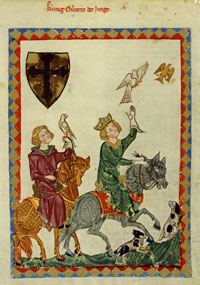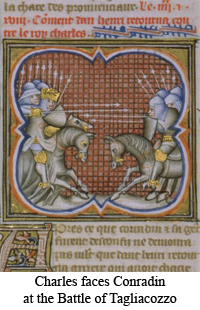In applying the

same methodology to the
Kingdom of Sicily as he
had to Provence, Charles produced the same result. In 1268,
Conradin
(left)

moved south from Germany to claim his
inheritance. He was born in Wolfstein, Bavaria, to Conrad IV
of Germany and Elisabeth of Wittelsbach.
Though heir to Conrad IV, the half-brother of Conrad, Manfred, had
seized the throne in 1258 based on the false rumor of Conradin's death.
With Manfred dead and the kingdom ripe for revolt, Conradin saw his
chance to regain his inheritance. Almost immediately, southern Italy and Sicily rose in revolt
in support of him.
Included in this revolt were most of the nobility who had survived the
Battle of Benevento and whom Charles had spared, including the important Lancia
family. Unfortunately, Conradin was too young and too poorly
equipped to deal with someone of the stature and experience of Charles of
Anjou, and in 1268 at Tagliacozzo Conradin was soundly beaten after a
close battle. Following a show trial, Charles had the captured Conradin
beheaded, an act which shocked even his supporters and gained Charles the
reputation of being cruel and ruthless. Charles moved swiftly to crush any
further resistance and began to confiscate the land of not only families
who supported Conradin, but also those who had previously supported
Manfred. These lands were handed to Angevin and Tuscon followers, while
the replacement of local officials by Angevin administrators was
accelerated. Many of the important families were forced to flee, and
several, including the Lancia family, chose exile in the Crown of Aragon.
Among others to escape the battle was
John of Procida
who eventually ended up in Aragon as Peter III's chancellor in 1276.
Through intimidation and coercion Charles appeared to stamp out any future
source of rebellion, but his actions would not be soon forgotten,
especially by the Sicilians.
 same methodology to the
Kingdom of Sicily as he
had to Provence, Charles produced the same result. In 1268,
Conradin
(left)
same methodology to the
Kingdom of Sicily as he
had to Provence, Charles produced the same result. In 1268,
Conradin
(left) moved south from Germany to claim his
inheritance. He was born in Wolfstein, Bavaria, to Conrad IV
of Germany and Elisabeth of Wittelsbach.
Though heir to Conrad IV, the half-brother of Conrad, Manfred, had
seized the throne in 1258 based on the false rumor of Conradin's death.
With Manfred dead and the kingdom ripe for revolt, Conradin saw his
chance to regain his inheritance. Almost immediately, southern Italy and Sicily rose in revolt
in support of him.
Included in this revolt were most of the nobility who had survived the
Battle of Benevento and whom Charles had spared, including the important Lancia
family. Unfortunately, Conradin was too young and too poorly
equipped to deal with someone of the stature and experience of Charles of
Anjou, and in 1268 at Tagliacozzo Conradin was soundly beaten after a
close battle. Following a show trial, Charles had the captured Conradin
beheaded, an act which shocked even his supporters and gained Charles the
reputation of being cruel and ruthless. Charles moved swiftly to crush any
further resistance and began to confiscate the land of not only families
who supported Conradin, but also those who had previously supported
Manfred. These lands were handed to Angevin and Tuscon followers, while
the replacement of local officials by Angevin administrators was
accelerated. Many of the important families were forced to flee, and
several, including the Lancia family, chose exile in the Crown of Aragon.
Among others to escape the battle was
John of Procida
who eventually ended up in Aragon as Peter III's chancellor in 1276.
Through intimidation and coercion Charles appeared to stamp out any future
source of rebellion, but his actions would not be soon forgotten,
especially by the Sicilians.
moved south from Germany to claim his
inheritance. He was born in Wolfstein, Bavaria, to Conrad IV
of Germany and Elisabeth of Wittelsbach.
Though heir to Conrad IV, the half-brother of Conrad, Manfred, had
seized the throne in 1258 based on the false rumor of Conradin's death.
With Manfred dead and the kingdom ripe for revolt, Conradin saw his
chance to regain his inheritance. Almost immediately, southern Italy and Sicily rose in revolt
in support of him.
Included in this revolt were most of the nobility who had survived the
Battle of Benevento and whom Charles had spared, including the important Lancia
family. Unfortunately, Conradin was too young and too poorly
equipped to deal with someone of the stature and experience of Charles of
Anjou, and in 1268 at Tagliacozzo Conradin was soundly beaten after a
close battle. Following a show trial, Charles had the captured Conradin
beheaded, an act which shocked even his supporters and gained Charles the
reputation of being cruel and ruthless. Charles moved swiftly to crush any
further resistance and began to confiscate the land of not only families
who supported Conradin, but also those who had previously supported
Manfred. These lands were handed to Angevin and Tuscon followers, while
the replacement of local officials by Angevin administrators was
accelerated. Many of the important families were forced to flee, and
several, including the Lancia family, chose exile in the Crown of Aragon.
Among others to escape the battle was
John of Procida
who eventually ended up in Aragon as Peter III's chancellor in 1276.
Through intimidation and coercion Charles appeared to stamp out any future
source of rebellion, but his actions would not be soon forgotten,
especially by the Sicilians.


